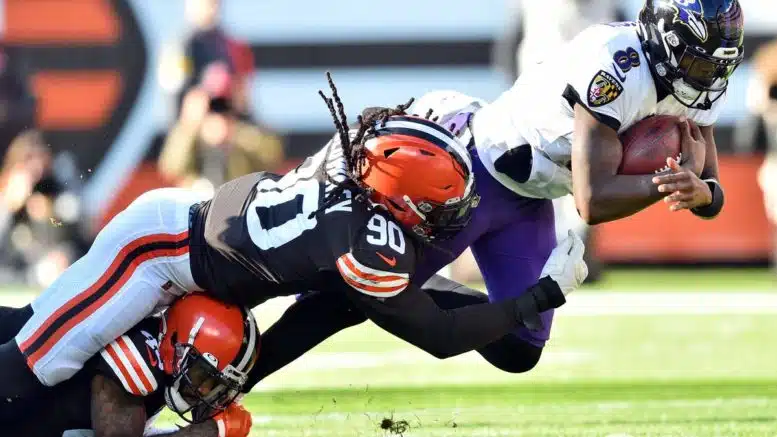The Baltimore Ravens co-opted college tactics as much as any team in the NFL over the past five years — it just wasn’t the trendy playbook. The staff built a run-oriented scheme around Lamar Jackson, taking QB-run tactics from college, and tweaking them for the pros. It worked for a while, and earned Jackson an MVP and a massive contract extension, yet the NFL is still a passing league, and the Ravens ceiling has been lower because of it.
Enter 2023: New offensive coordinator Todd Monken, Zay Flowers, Rashod Bateman, Odell Beckham Jr., Mark Andrews. Problem rectified. There’s a new era of Ravens football, and it’s allegedly going to be better.
“I’d say I’m a little bit anxious, but Coach [John] Harbaugh said in a meeting, ‘Don’t peak too soon.’ So, I’m not trying to peak too soon,” Jackson said this week. “I’m just pumped to be honest. [I] can’t wait to get out there.
“I feel very comfortable. I feel great actually. Just the explosiveness, getting the ball out [of] my hands faster, getting guys open. [I] just can’t wait to see it in a regular game now so we can actually talk about it more in-depth.”
That’s great, and sounds like every other quarterback talking about a new playbook.
The question is how much better is the offense going to be really?
Bateman is coming off a Lisfranc foot injury, and had to be brought along slowly in camp. Beckham is coming off his second ACL tear, and turns 31 this season. For all the hype that Flowers is getting, it still needs to translate to Sundays. While I like that Jackson still has his safety valve in Andrews, in recent years he’s been more crutch than escape pod for the QB.
A modern offense is a step in the direction of sustainable, successful football, but the crucial progression for Baltimore is overcoming adversity, and figuring out how to score when plans A through C aren’t working.
Learning curve?
A successful air game is built through chemistry with the pass catchers and familiarity with the system. The Ravens have neither, and I think we’re going to see a lot of inconsistency early on.
Baltimore opens with Houston, plays Indianapolis in Week 3, and visits all three AFC North foes in the other first five weeks of the season. Those AFC South opponents at home are going to look a lot different from the slugfests on the road in the division. Even peak Ben Roethlisberger played like someone gave him a dead leg when facing average AFC North teams.
What I want to see more so than any 350-yard, 3 TD passing performance is what Jackson does when it’s a grind. That’s when the Ravens have gotten bogged down before, and as good of a coach as Harbaugh is, the team hasn’t found a solution for stagnation during the Jackson era.
Defenses can limit explosive plays and long drives require luck and mistake-free execution. The best NFL offenses are as opportunistic as they are efficient. Cincinnati probably returns to the Super Bowl last year if they get points on two of their final four possessions against Kansas City instead of only one.
A contemporary play-caller should allow Jackson — and the Ravens — to use its full arsenal, and that’s exciting for football fans, full stop. However, teams need to be flexible, too, and able to pivot from a game plan that’s not working. Do not confuse that with abandoning the run, or panicking.
Occasionally, things turn to FUBAR in the NFL, and both offenses look lost until one reaches into the far recesses of its hindquarters and yanks out a drive. It’s raining, or Odell is pissed, or half the line forgot how to block, or it’s just not the offense’s day.
When I see Jackson and the Ravens overcome those snags with regularity, then I’ll believe the riddle of their offense has been solved.
Original source here
#Ravens #offense #good #backup #plan





